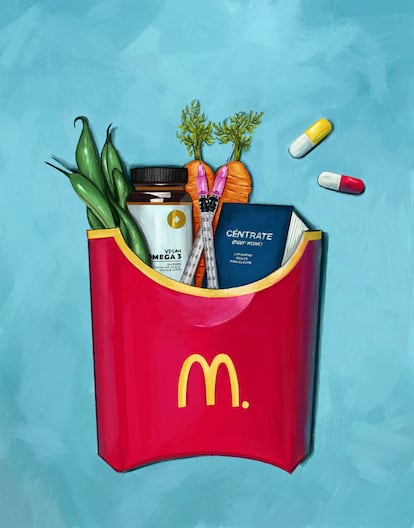No carbs, no smoking and hardly any alcohol: The party’s over for Gen Z
Nearly 80% of those born between 1997 and 2012 have strict criteria when it comes to what they eat and drink

You’re to be forgiven for calling them Gen ZZZ. Overly concerned about their health and driven by a fear of aging (even if they’ve yet to turn 30), they don’t smoke, barely drink alcohol, avoid sugar and fast-digesting carbohydrates. They don’t go out much and rise at dawn to do 40 burpees and 80 lunges while their TikTok productivity gurus whisper to them, “Win the morning and you win the day.”
This is a generation that saves up to buy premium gym memberships and takes collagen, magnesium, protein and adaptogen supplements. They venerate order, discipline and the stoic doctrine where their elders opted for epicurean hedonism. Note that recent reports on “problematic” phenomenon like elevated alcohol consumption and sexually transmitted infections find that they are not prevalent among the younger generations, but rather, the 55 and up club, Gen Z’s parents and grandparents.
In contrast, youngsters (to greater and lesser extents) feel ashamed if their lifestyle is not considered “healthy.” Nearly 80% take health into account when making decisions as to what to eat and drink. This encompasses both physical and emotional health, according to a 27-market global study that was commissioned by Ikea, Pepsi-Cola, Visa and WWF International, among other corporations. The report suggests that as age decreases, hours spent at the gym increase, as do concerns about mental health and stress management.
Little given to irony, Gen Z has taken the adage that beauty is on the inside to heart. Terrified of aging, they invest in skincare products and, though they are more skilled at makeup than their progenitors, undergo lymphatic massage and anti-inflammatory diets that promise to make dark circles and cellulite disappear, not just concealed.
They want six-pack abs and defined quadriceps. They’re not looking for jeans that create the appearance of a “nice butt” — they want one for real, and sculpt it in the gym through glut bridges and creatine. They want to see a smooth face free of fatigue, blemishes and acne in the mirror. When they are not at their best, they can post on social media that they have “cortisol face.” They live and breathe a specialized pseudo-slang that reflects an idea that aesthetics and beauty represent the optimization of health, even at the cost of submitting to monastic discipline and an unending detoxification routine.
Is leading a life organized around productivity hours, judging everyday acts by efficiency standards, and cloistered schedules compatible with the wildness of youth? Are we seeing the rise of the most ordered, healthy and boring generation ever?
“It is probably one of the best-informed generations of all time, in terms of nutrition and the negative effects of alcohol, but it does have certain obsessions and changes in habits. They likely won’t die of a heart attack in their 50s, but they could have other problems with anabolic steroids that they take in the gym to get a hard body, with defined and hypertrophied muscles,” says psychologist Luis Miguel Real, who says that for young people, physical identity and earning money are the maximum expressions of happiness. “What I’m seeing at my office is the adoption of productive toxic habits that put their mental health at risk. They don’t invest in healthy relationships and they have the dangerous idea that they can rely on themselves for everything.”
“Normalize canceling plans,” is an entire category on TikTok that illustrates the ideal weekend itinerary for many young people: staying in their room on their telephone, unexposed to the risks of an analog social life. They’re much more comfortable scrolling than they are talking to strangers.
Oriol Bartomeus, director of the Institute of Political and Social Sciences of the Autonomous University of Barcelona, thinks that for younger generations, the pandemic was a kind of testing ground that taught them how to be alone, to relate to themselves and the world through a screen. “It is a generation of existential angst,” he says.
Perhaps that explains why they never answer the phone. Nothing horrifies them more than an incoming call and the thought that someone is waiting for them to answer. A recent poll by the U.K. price comparison site Uswitch found that a fourth of respondents between the ages of 18 and 34 never pick up their phones. They ignore calls and later, respond with a message. If they don’t recognize the number, they Google it. More than half of those polled associate the sound of the telephone with bad news.
Experts have noted that digital interactions often outnumber face-to-face contact, and that this digital lifestyle doesn’t require social lubricants like alcohol, whose consumption has fallen drastically. According to a Health Behavior in School-Aged Children study sponsored by the World Health Organization, only 8% of young people consume alcohol on a weekly basis — a percentage that stood at 25% in 2006. Not to mention, nearly 80% think that consuming five or six drinks in a weekend could have “serious consequences.” Fortunately, decades of public campaigns against excessive alcohol consumption appearing to be bearing fruit.
“Beer and wine have ceased being the default beverages,” says Felipe Romero, a partner at consulting firm The Cocktail. According to data from Euromonitor International, the non-alcoholic beverage market in Spain has grown by 18% every year during the past three years. Romero outlines a current panorama in which energy drinks, smoothies and mineral waters are dominant. “And if they do drink, it’s always lower-alcohol drinks. Behind it all is a very strong desire to be constantly available, active, productive. Alcohol doesn’t optimize any of that,” he says.
In the Western world, startup companies are finding success in addressing this need for a binge without the hangover. They are betting on new drinks that toe the line between alcohol and abstinence. In other words, products that provide some degree of disinhibition and joy, while maintaining lucidity and control. These are known as “functional non-alcoholic spirits,” the most popular of which is Three Spirit, a kind of infusion of green tea, ashwagandha and lion’s mane that has nootropic effects, meaning that it calms the mind and improves memory and concentration — touching on three weaknesses among the first generation of digital natives.
In the U.K., neuropsychopharmacologist David Nutt has developed Sentia Spirits, a herbal concoction that acts on the brain’s GABA receptors, imitating the benefits of alcohol on social skills, another Achilles’ heel of a generation that is more at ease in front of a screen. A report by Spain’s Fad Juventud Foundation claims that only 13% of young people seek “fun at all costs” and that the majority prefer to enjoy themselves in a “safe and pleasant environment.”
Anthropologist Helen Fisher has called younger generations “the new Victorians.” After interviewing tens of thousands of single people — 5,000 a year — for her project Singles in America, she concluded that sex is on its way out of their top five priorities, gradually being replaced by economic security. Figures from the Pew Research Center corroborate that sexual activity has fallen to its lowest level in the last 30 years, dragged down by a lack of interest among the youngest age groups.
In Spain, more than 30% of Gen Z responded to a national survey on sexuality and contraception that they had not had sexual relations “in recent months.” Experts don’t buy the theory that there’s a lack of interest in sexual relations among young people. Rather, they believe that they prefer controlled and solitary practices that save them from embarrassment and provide the same pleasure. According to The Economist, many young people of both genders consider the exchange of fluids annoying and cumbersome.
However, they do seem to be more willing to make sacrifices. Specifically, to get up every day at 5 a.m. to optimize their cognitive performance and be productive. From the current mediascape, one might think that every person who has been successful in life — from Jennifer Lopez to Tim Cook — starts their day at this magical hour.
The ritual is underpinned by bestsellers like The 5 AM Club by Robin Sharma (HarperCollins) and the TikTok community #5amClub, which is tagged on more than 18 million posts shared by early risers documenting impressive early-morning routines that feature thorough tooth-brushing, calisthenics, burpees and meditation. As to the usefulness of this habit, Russell Foster, director of the Oxford University’s Sleep and Circadian Neuroscience Institute, has said: “In my experience, the only difference between morning people and evening people is that those people who get up early in the morning are just horribly smug.”
Bartomeus, who is also the author of the book El peso del tiempo: Relato del relevo generacional en España (The Weight of Time: The Generational Shift in Spain), believes that this is an “overwhelmed” generation that is calling for a return “to the basics, to a simpler world.” “They have assumed that the future will be terrible, that the party is over. They all feel like victims and are looking for revenge. In politics, this translates into the idea, ‘Let someone come along who is in charge, who will impose over.’ They do not tolerate plurality, especially the boys, who are more devoted to the doctrines of order and stoic precepts of the battery of the gym and the idea of becoming millionaires.”
The most recent World Happiness Report finds that this generation is unhappier than their parents and grandparents. Since 2006, levels of happiness among young people have fallen on every continent. The healthiest, most organized generation in recent history is not having a good time. Could it be that older generations — hello, Boomers, Gen X and Millennials — are missing something?
Sign up for our weekly newsletter to get more English-language news coverage from EL PAÍS USA Edition
Tu suscripción se está usando en otro dispositivo
¿Quieres añadir otro usuario a tu suscripción?
Si continúas leyendo en este dispositivo, no se podrá leer en el otro.
FlechaTu suscripción se está usando en otro dispositivo y solo puedes acceder a EL PAÍS desde un dispositivo a la vez.
Si quieres compartir tu cuenta, cambia tu suscripción a la modalidad Premium, así podrás añadir otro usuario. Cada uno accederá con su propia cuenta de email, lo que os permitirá personalizar vuestra experiencia en EL PAÍS.
¿Tienes una suscripción de empresa? Accede aquí para contratar más cuentas.
En el caso de no saber quién está usando tu cuenta, te recomendamos cambiar tu contraseña aquí.
Si decides continuar compartiendo tu cuenta, este mensaje se mostrará en tu dispositivo y en el de la otra persona que está usando tu cuenta de forma indefinida, afectando a tu experiencia de lectura. Puedes consultar aquí los términos y condiciones de la suscripción digital.









































